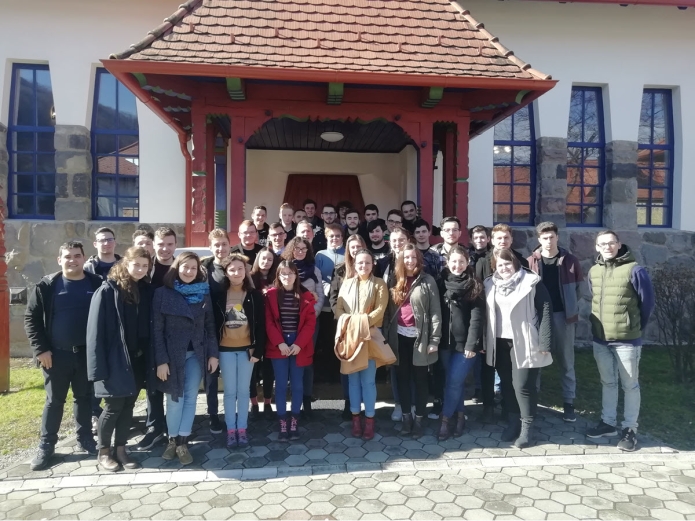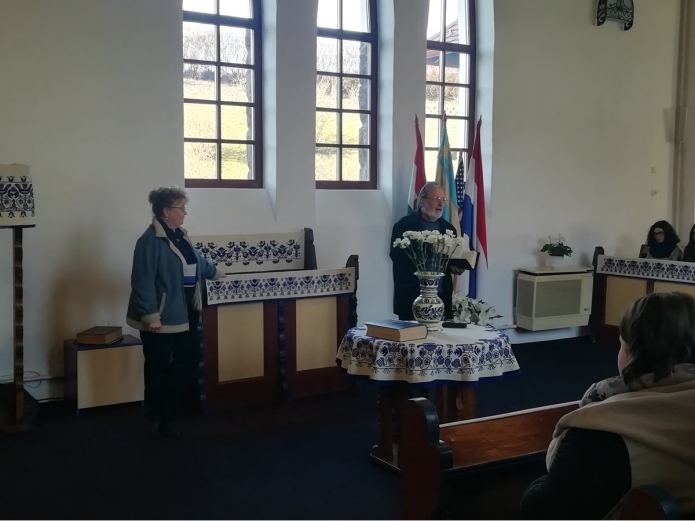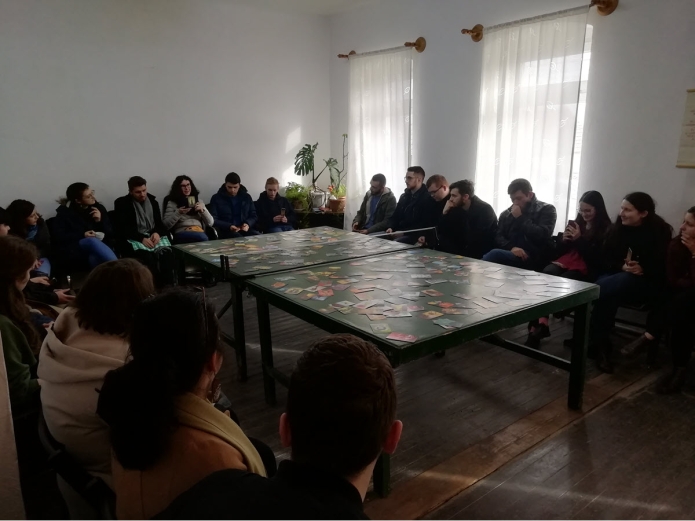On March 5-6, under the leadership of youth pastor Árpád Sógor, the first- and second-year Reformed and Unitarian students embarked on a congregation-visiting tour within the Maros and Küküllő regions, as part of their practical course of Contextual congregational knowledge. The purpose of the practice was to familiarise themselves with the congregations in Transylvania.
The students of the Theological Institute visited congragations in the Maros and Küküllő regions



On March 5-6, under the leadership of youth pastor Árpád Sógor, the first- and second-year Reformed and Unitarian students embarked on a congregation-visiting tour within the Maros and Küküllő regions, as part of their practical course of Contextual congregational knowledge. The purpose of the practice was to familiarise themselves with the congregations in Transylvania. In addition to discovering the diversity of the congregations, another important goal was to enhance self-awareness, mutual understanding and strengthen relationships among the students.
Following our departure from Cluj-Napoca, the first stop was Marosludas (Luduș), where the group was welcomed by Csaba Levente Czirmay, leader of the Maros church county, his wife Izabella (the choir director of the congregation), and assistant pastor István Márton. Thanks to a local bakery, the students had the opportunity to enjoy a small snack, which was much appreciated after a long journey.
Árpád Sógor conducted a devotional (Deuteronomy 8:6), addressing the journey on God's path, reflecting on the sacrifices and renunciations associated with pastoral service, which, despite challenges, is rich in blessings. He encouraged us to recognize God's work in the congregation and in our own lives, urging us to seek guidance and advice from Him in our decision-making.
The group discussed with the assistant pastor the importance of practical preparation alongside theoretical education in the university. It was emphasised that theoretical training alone is not sufficient to address congregational issues; practical preparation, involvement in internships, and maintaining open eyes and a willingness to learn during any form of service are crucial. Czirmay stressed the significance of building collaborative relationships within the congregation. Comparing our vocation to the success of construction workers, he pointed out that spiritual building of the church may not always be as evident as the external building, but the invested energy is never wasted. The group also touched on the history of the community and various congregational events, and the minister, who also holds a leading role in the church county, spoke about the daily challenges he faces in his second significant area of service.
After breakfast, the group continued our journey to Mezőpanit (Pănet), where they were welcomed by Tibor Kovács, the pastor involved in church building, his wife Sarolta, and the leaders and collaborators of the congregation. They spoke about the soul and community-shaping power of prayer, the building power of the Scriptures, and the diversity of congregational work. They emphasised the importance of not dwelling on the past but setting goals for the pastoral career. It was a unique experience to see a congregation that, despite alienation familiar from society in general, expands its church building in response to the growing demand for worship.
With strengthened vocational awareness, the students proceeded to Mezőbergenye (Berghia), where we were hosted by Pastor Béla Domahidi and his wife Emese, along with the congregational diaconal team. They shared insights into family visits, confessions of faith, authentic preaching, lifestyle, and practical advice on continuous readiness. They emphasised the need for pastors to feel the heartbeat of their congregation, highlighting the importance of mutual trust and love.
Becoming more equipped with insights and experiences, we traveled to Marosvásárhely (Târgu Mureș) to visit urban congregations. In the congregation of Marosvásárhely-Kövesdomb, we talked with Pastor JánosLőrincz, and his wife Hajnal, as well as Árpád Erdei (a sixth-year intern), and assistant pastor Mihály Orbán. Discussions covered topics such as attention to the presbytery, spiritual church building and youth work, as well as sister congregation relationships, certain aspects of preaching, and modernisation. The pastor illustrated key milestones and achievements in his ministry with a visual report.
We also visited another congregation in Marosvásárhely, Cserealja. It was noteworthy to learn about the division of duties from pastors Béni Papp, Melinda Berekméri and Krisztián Barticel-Kiss. We met Árpád Varga, a sixth-year intern, and heard about the rotational distribution of responsibilities among the pastors, emphasising the importance of communication, humility, mutual respect, acceptance, and, above all, love in a well-functioning congregation. We learned about various congregational programs and events, and were introduced to some catechetical practices.
Our first day of congregation visits concluded in Parajd, where we stayed at the Urbán Andor Conference Center. After dinner, Pastor Csaba Kántor, the leader of the Székelyudvarhely church county and vice-bishop of the church district, spoke about the history of the church county, current issues in our church district, and the relationship between congregation members and pastors. Night-long discussions followed, filled with laughter and enthusiasm for the second part of our journey.
The next morning, students listened to the devotional of our colleague Szabolcs László, and then entered the magnificent and secure walls of the Reformed Church in Szováta (Sovata). Here, we were welcomed by the pastoral couple Sándor Baczoni and Szilárdka Baczoni. The pastor's wife shared about the challenges she experienced in her ministry, the complexities of the system before '89, all under the providential grace of God. They emphasised the essential nature of task-sharing among pastors, as everyone has received talents to be used in their respective areas of work, whether with children or the elderly. We also discussed the upbringing of pastor's children.
In the Unitarian congregation of Szováta, the group was received by Pastor Csongor Benedek, who passionately spoke about the small but active community, administrative work, and the challenges of his years spent as a pastor in scattered areas.
The lunch was served at the Teleki Educational Center in Szováta, after which the group headed towards Marosugra, where it was welcomed by the pastoral couple Csilla Lőrincz and Vilmos Lukács, along with their three young children. It was noteworthy that, in addition to Marosugra, they also serve in Kutyfalva. They discussed serving in two congregations as a married couple, emphasising the importance of maintaining and nurturing long-established relationships and friendships. This was the last stop, and thanks to Pastor Vilmos Lukács, the group concluded its mission trip with a game. Using Dixit cards, we briefly spoke about how one sees oneself as a pastor. This game was a fitting conclusion to the journey.
The active participation of female pastors and pastor's wives in congregational life, along with the associated challenges and joys, was a recurring topic. Several ministers also expressed that bricks, mortar and lime were never lacking from the parsonage yard, as congregational building unmistakably has two sides. We learned a lot from their life examples.
The group would like to express its gratitude to the hosts, the kind driver, the generous donors, the Dutch Fundament Foundation, whose support made this study trip possible, and last but not least, Árpád Sógor, who guided the group throughout this journey.
To God be the glory for all these experiences!
Paul Füstös
second year BA student